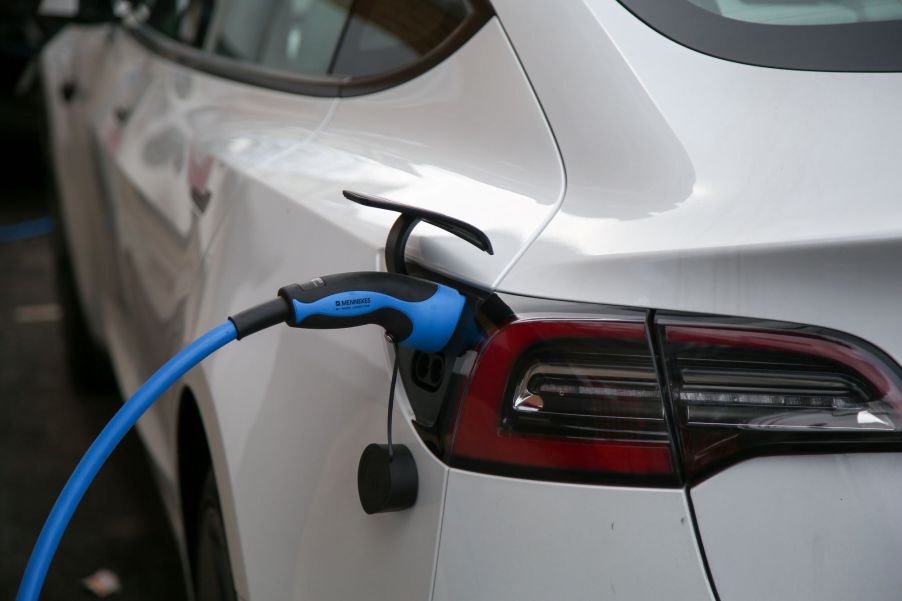
Freewire and SparkCharge Make EV Charging Simple by Bringing It to You
You don’t need to be an automaker to cash in on the growing demand for electric vehicles (EVs). There’s a need for EV components, such as batteries and motors, essential metals like lithium, and charging infrastructure.
Charging infrastructure companies can not only make money off the charging stations themselves, but many companies are eligible for certain government subsidies that can make them even more profitable.
Still, charging stations remain few and far between in many country areas. A couple of companies, FreeWire and SparkCharge, aim to lift the cap that such uneven development has placed on the growth of the overall EV market.
Why EV sales continue to rise

A few decades ago, automakers were highly reluctant to introduce EVs. Few companies seriously considered the possibility, thinking they’d lose millions of dollars given low consumer demand and the billions needed to develop nationwide charging infrastructure.
Even when some companies like General Motors, Ford, and Honda, built concept EVs, the auto industry at large remained deeply skeptical about the likelihood that EVs might be successful.
However, as climate change shifted both consumer demands and regulatory standards, more and more automakers began investing in EVs for the long term. Furthermore, the success of hybrid vehicles, like the Toyota Prius, demonstrated to the industry that eco-friendly vehicles could be profitable. Tesla’s enormous success proved that pure EVs could be marketable and highly lucrative.
The rise of EV sales is fueled by increased federal and state government subsidies for both manufacturers and consumers. Automakers and consumers have failed to manufacture and purchase EVs, respectively, for basically the same reason: fear of the growing pains that inevitably come with being the first to do something.
But consumers can get a $7,500 tax credit for EVs through the 2008 Energy, Improvement and Extension Act. And there have been numerous manufacturing subsidies, including grants offered under Presidential authority and through Congressional legislation.
How Freewire and SparkCharge could spur more EV sales
Still, many consumers remain anxious about purchasing EVs, given that charging stations still are not as common as gas stations. However, a few different companies are working to build more charging stations throughout the country. According to Forbes, some companies, such as FreeWire and SparkCharge, are piloting mobile charging to ensure EV drivers don’t need to worry about a dead battery and being stranded.
As per Green Car Reports, SparkCharge creates charging units mounted in towing vehicles. An EV driver, faced with a dead or dying battery, could connect with a SparkCharge vehicle via a smartphone app or by ordering roadside assistance. The SparkCharge vehicle could meet them where they are and give them a charge, avoiding the need for the driver to have their vehicle towed to a charging station.
FreeWire Technologies has also developed fast-charging stations drivers can use. These stations can be placed at specific locations and moved as necessary to accommodate more drivers. Using these stations allows gas stations to avoid investing significant sums in charging infrastructure that fixed stations require. It also conceivably allows more businesses, such as auto repair shops and retail auto supply stores, to offer charging.
Why EVs still underperform gas-powered vehicles in many areas
These options are still relatively new. But they may help allay consumers’ remaining fears about EVs in certain parts of the country. Rural consumers are especially reluctant to purchase EVs, and rural consumers in the West face unique charging-related problems.
When you look at states like North Dakota or Wyoming, building viable infrastructure is more difficult given these states’ high elevation and extreme temperatures. Both of these factors can reduce an EV battery’s range. However, automakers are still trying to understand and account for these variables. Also, given how expansive the rural West is, cloud-based EV charging applications suffer in areas with poor Internet connectivity.
However, companies leveraging renewables can help address some of these challenges. Renewable energy sources are more plentiful out West and can improve the viability of charging stations. Further, the Bipartisan Infrastructure Act of 2021 contains substantial funding for broadband access and EVs. And with companies like FreeWire and SparkCharge also helping to plug the gap, the future of the EV market out West looks bright indeed.


